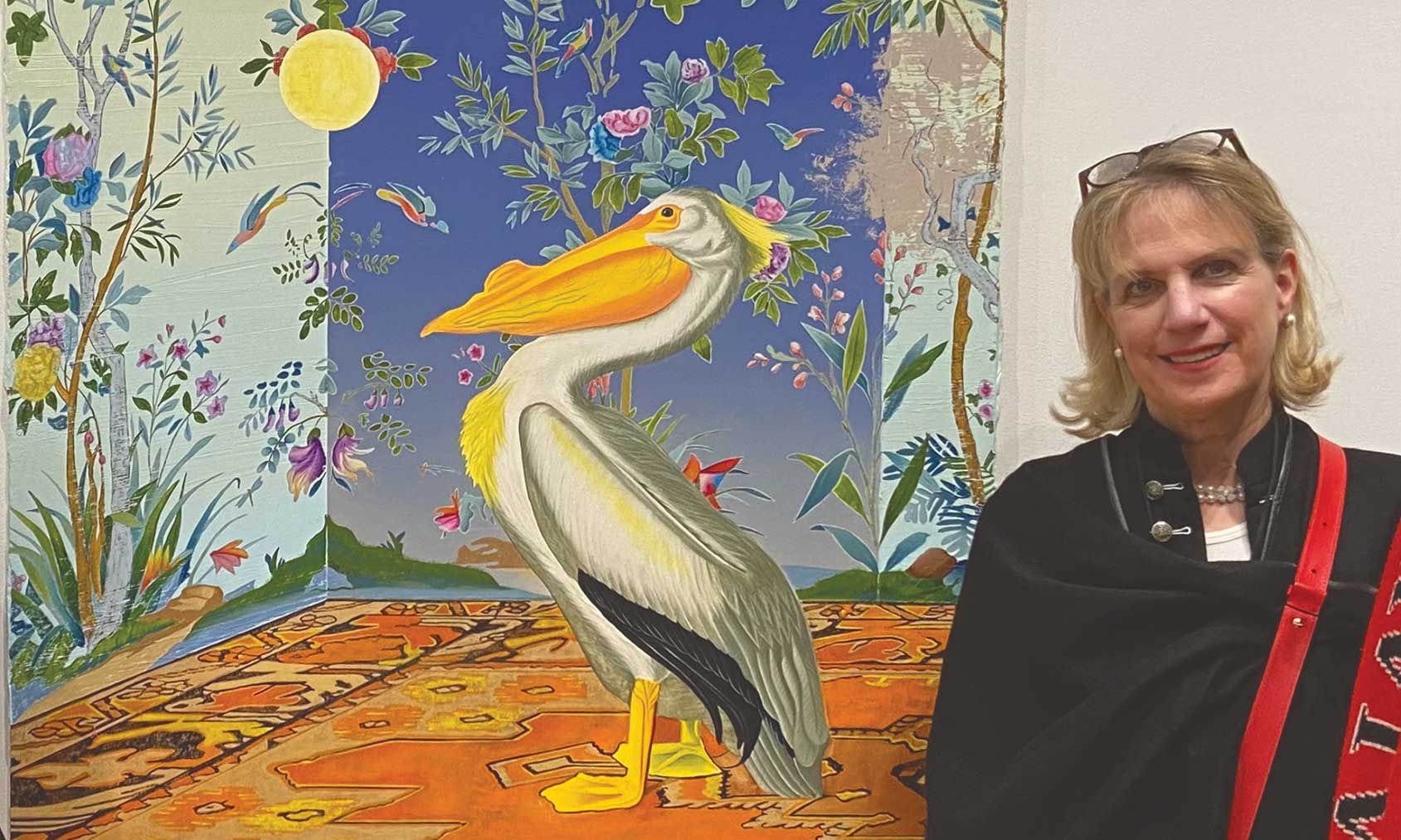Von Habsburg with a recent purchase: Stephen Thorpe’s A Mediation Between the Physical and Spiritual World (2022) Courtesy of Elizabeth Von Habsburg
One could be forgiven for thinking that being Austrian royalty is the most interesting thing about a person. But that is not the case with Elizabeth von Habsburg. Apart from having several decades of experience in the art world and working as the managing director of the art appraisal and advisory firm the Winston Art Group, she and her husband Géza von Habsburg have a dynamic and historically varied collection of art. Their holdings stretch from ultra-contemporary canvases that swim in surreal technicolour to classical sculptures and a fossilised sea creature from the Eocene epoch.
For von Habsburg, collecting art is a social dialogue between her and the work. Sometimes, she says, a piece speaks to her immediately, while with others the conversation has to go on until she and the work can find common ground. However she goes about choosing the works in her collection, she is the picture of the modern collector. There are no boundaries or eras or periods one should stick to, as she sees it, no need to box oneself in. From the contemporary to the ancient, nothing matters other than that the work speaks to you.
Von Hapsburg was on the board of the Appraisers Association of America from 2003-15, served as board member and chair of the Appraisal Foundation in 2014 and is a published author, editor and frequent lecturer.
The Art Newspaper: What was the first work you bought?
Elizabeth von Habsburg: We were lucky enough to spend summers in London and across the street on South Audley [in Mayfair] was a gallery that sold watercolours. I was passionate [about] everything to do with horses and found a small work by Charles Cooper Henderson. I think it was £15. It still brings a smile and joy every time I look at it.
What is your most recent buy?
Buying art is like meeting a new friend. Sometimes you click instantly; other times it is a longer process. Two works I bought at Nada New York in May were instant and forever friends: Pere Llobera’s Ogino Knaus [2020] and Rajni Perera’s Floating Skin [2022].
If your house was on fire, which work would you save?
Can I pick a few? Our superb and amazing work by Stephen Thorpe, a vibrant and gorgeous painting by Amir Fallah, our 40-million-year-old fossilised fish (except it weighs over 100 pounds!), a Meiji bronze rat, a Roman chimera in bronze and a portrait of my husband’s great-great-great grandfather, Emperor Franz Joseph.
If money were no object, what would be your dream purchase?
No question: St Francis in the Desert [1476-78] by Giovanni Bellini at the Frick Collection in New York City. Not sure they would appreciate that, however.
What is the most surprising place you have displayed a work?
That would be the 18th-century Augsburg brass compass and sundial that sits in the car for when all the modern electronics fail.
Which artists, dead or alive, would you invite to your dream dinner party?
I could fill a stadium, but here are just a few of many: Robert and Sonia Delaunay, Benozzo Gozzoli [painter of the Renaissance fresco cycle in the Palazzo Medici Riccardi], Julie Mehretu, Shahzia Sikander, Brian Donnelly [KAWS], Banksy, Hunt Slonem, Georgia O’Keeffe, Faith Ringgold, Amir Fallah, Stephen Thorpe, Hans Holbein, Robert Campin [who painted the Mérode Altarpiece, 1427-8], Tracey Emin, Andrew Ntshabele, Jan van Eyck and Élisabeth Vigée le Brun.
What’s the best collecting advice you’ve been given?
Be humble and ask questions. Think about buying works that have a thread that connects them.
What did you miss most during lockdown?
Talking to artists, gallerists, friends, colleagues, clients and family face to face, and seeing art first-hand. The first exhibition I saw after lockdown was the Julie Mehretu show at the Whitney Museum of American Art. Every colour, shape, sound and image was a joy.
Have you bought an NFT?
I bought a virtual dog at Nada New York, does that count?

